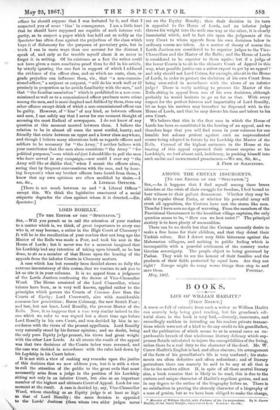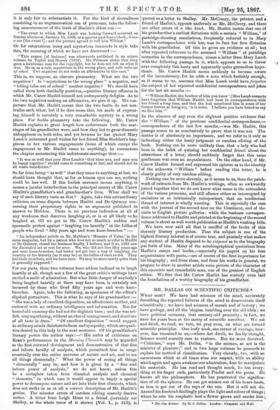B OOKS.
LIFE OF WILLIAM IIAZLITT.*
A nowt so full of extracts froni such a writer as 'William Hazlitt can scarcely help being good reading, but his grandson's edi- torial share in the book is very bad,—slovenly, inaccurate, and exceedingly reckless in intruding on his readers private transac- tions which were not of a kind to do any credit to his grandfather, and the publication of which seems to us in several cases an un- pardonable breach of that wholesome literary delicacy which sup- presses fletails calculated to injure the susceptibilities of the living, unless there be a real duty to the character of the dead. Mr. W. Carew Hazlitt's English is bad, and often obscure; his arrangement of the facts of his grandfather's life is very confused ; his state- ments are often defective and often redundant ; and of literary portraiture there can scarcely be said to be any at all that is due to the modern editor. If, in spite of all these mortal literary sins, a book remains that is likely to be read, this is due to the curious and unique character of Hazlitt's repellent genius, and not in any degree to the author of the biography before us. There is no satisfaction in proving the slovenly character of a biography of a man of genius, but as we have been obliged to make the charge, • Memoirs of Wuliam Ilaztitt, with Portions of his Comspondence. By W. Carew Hazlitt, of the feller Temple, Ilerri.ter-at.Lsw. L9ndon:
it is only fair to substantiate it. For the kind of slovenliness consisting in an ungrammatical use of pronouns, take the follow- ing announcement of the birth of Hazlitt's eldest son :—
"The event to which Miss Lamb was looking forward occurred on Sunday afternoon, January 15, 1809, at a quarter past four o'clock; it was a son [the event?] ; and the parents agreed to call him William."
Or for ostentatious irony and mysterious innuendo in style take this, the meaning of which we have not discovered :—
" This course [of lectures] was afterwards published in an octavo volume by Taylor and Hessey (1819). Mr. Patmore states that they gave a handsome sum for the copyright, but he does not tell us what it was. He is, as a rule, mysterious in the wrong place, and tells tales out of school. Two negatives do not make an affirmative in this case."
This is, we suppose, an obscure pleasantry. What are the two negatives ? Is "mysterious in the wrong plane" a negative, and "telling tales out of school" another negative ? We should have called them both decidedly positives,—positive literary offences in which Mr. Carew Hazlitt himself not unfrequently delights. As to the two negatives making an affirmative, we give it up. We con- jecture that Mr. Hazlitt means that the two faults do not neu- tralize each other, but if he does mean this, his mode of express- ing himself is certainly a very remarkable mystery in a wrong place. For feeble pleasantry take the following. Mr. Carew Hazlitt explains at great length how unfortunate both the mar- riages of his grandfather were, and how they led to great domestic unhappiness on both sides, and yet because he has quoted Mary Lamb's reiterated good wishes for her friend Miss Stoddart's hap- piness in her various engagements (none of which except the engagement to Mr. Hazlitt came to anything), he commences the chapter announcing this unfortunate marriage thus :—
" It was as well that poor Miss Lamb's God bless yon, and may you be happy together!' should come to something at last, and should not be all waste benedicites."
So far from being" as well" that they came to anything at last, we should have thought that, as far as human eyes can see, nothing could be lees well. If this foolish sentence means anything, it means a jocular introduction to the principal misery of Mr. Carew Hazlitt's grandfather's and grandmother's lives. What shall we say of such literary taste as that ? Again, take this extraordinary criticism on some dispute between Hazlitt and 1)e Quincey con- cerning their proprietary rights in an argument published in answer to Malthus. There is no previous indication at all of any weakness that deserves laughing at, or is at all likely to be laughed at, till we get to Mr. Carew Hazlitt's sudden and spasmodic protest against "laughing too heartily" at the follies of people who lived "fifty years ago and wore knee-breeches" :—
" An independent article on Mr. Malthus's Measure of Value,' in the same magazine, but by a person who does not so much as refer to Hazlitt or De Quincey, closed the business finally, I believe, and if so, 1823 saw the discussion set at rest for ever. We, who did not live fifty years ago and wear knee-breeches, had better not get into a way of laughing too heartily or too bitterly (as it may be) at the follies of such as did. They had their crotchets, and we have ours. We may be more nearly quits than is generally supposed."
For our parts, these two volumes have seldom inclined us to laugh heartily at all, though not a few of the great critic's writings have excited a smile of admiration. But what little danger of anybody's being laughed heartily at there may have been, is certainly not incurred by those who lived fifty years ago and wore knee- breeches. Again, take the following, as specimens of the editor's slipshod portraiture. This is what he says of his grandmother :— " She was a lady of excellent disposition, an affectionate mother, and endowed with no ordinary intelligence and information. But for household economy she had not the slightest turn ; and she was sel- fish, unsympathizing, without an idea of management, and destitute of all taste in dress." "Of excellent disposition" would suggest to ordinary minds disinterestedness and sympathy, which are quali- ties denied to this lady in the next sentence. Of his grandfather's literary power the author says :—" His series of criticisms on Ke,an's performances in the Morning Chronicle may be regarded as the first outward development and demonstration of that fine and inborn faculty of analysis, which permitted him to range eventually over the entire universe of nature and art, and to see all things elementally." What the power of seeing all things " elementally" may be, and how it is given by a "fine and inborn power of analysis," we do not know, unless this be a metaphor taken from chemical analysis and chemical "elements," in which case it would appear to imply a special power to decompose nature and art into their first elements, which does not strike us as at all a correct description of Mr. Hazlitt's genius. The minuter errors of careless editing scarcely deserve notice. A letter from Leigh Hunt to a friend (certainly not Shelley, as the whole tenor of it shows) (Vol. I., p. 312), is quoted as a letter to Shelley. Mr. MaCremy, the printer, and a friend of Ilazlitts, appears uniformly as Mr. McCleery, and there are other errors of, a like -kind. 11r. Hazlitt insists that one of his grandmother's earliest flirtations with a certain "William," of partridge-shooting associations, frequently referred to in Maly Lamb's correspondence with her, was in fact her first flirtation with his grandfather. Of this- he gives no evidence at all ; but after repeated reference to the assumed "William" of partridge memories in the correspondence, comes a letter from Mary Lamb with the following passage in it, which appears to us to throw over completely this hasty .and apparently- quite groundless hypo- thesis. Mr. Carew Hazlitt seems suddenly to become aware of the inconsistency, for he adds a note which foolishly enough, as it seems to us, assumes that Miss Lamb could have forgotten the subject of her repeated confidential correspondence and jokes for the last six months :— " 'William Hazlitt, the brother of him you know' (Miss Lamb seems to have forgotten that William llazlitt had been in correspondence with her friend a long time, and that she had mentioned him in some of her former letters as being so), is in town. I believe you have heard us say we like him.'" In the absence of any even the slightest positive evidence that the "William" of the previous confidential correspondence,— correspondence of the last few months,—was Mr. Hazlitt, this passage seems to us conclusively to prove that it was not. The matter is of absolutely no importance, and we refer to it only as indicating either the hasty judgment or careless editing of the book. Nothing can be more unlikely than that a lady who had been in the habit of priming her confidential friend about the attractions of a lover, should suddenly forget that this same gentleman was even an acquaintance. On the other hand, if Mr. Carew Hazlitt formed and expressed his opinion as to the identity of the unknown " William " before reading this letter, he is clearly guilty of very careless editing.
Nothing can be more slovenly, as it seems to us, than the patch- work of extracts from Mr. Hazlitt's writings, often so awkwardly joined together that we do not know what name is.the antecedent of the various pronouns, and still oftener either so interrupted by omissions or so intrinsically unimportant, that an intellectual thread of interest is wholly wanting. This is especially the case with the journal of the second tour on the Continent, and of the visits to English picture galleries : while the business correspon- dence addressed to Hazlitt and printed at the beginning of the second volume is about as well worth publication as Hazlitt's washing-bills.
We have now said all that is needful of the faults of this slovenly literary production. That the subject is one of the highest literary interest is of course true, and precisely what makes any student of Hazlitt disposed to be exigeant as to the biography put forth of him. Many of the autobiographical quotations from Hazlitt's essays and books,—especially his papers on his first acquaintance with poets,—are of course of the first importance for his biography ; and from these, and from his works in general, we propose to draw in another article some picture of the Character of this eccentric and remarkable man, one of the greatest of English critics. We fgar that Mr. Carew Hazlitt has scarcely even laid the foundations of a worthy biography of his grandfather.































 Previous page
Previous page